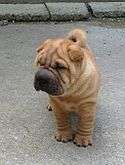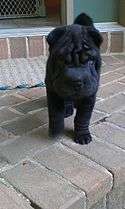Miniature Shar Pei
|
Miniature Shar Pei with a Black Brush Coat | |||||||||||||||||||||||||||||
| Other names |
Mini Shar Pei Mini Pei | ||||||||||||||||||||||||||||
|---|---|---|---|---|---|---|---|---|---|---|---|---|---|---|---|---|---|---|---|---|---|---|---|---|---|---|---|---|---|
| Country of origin | China | ||||||||||||||||||||||||||||
| |||||||||||||||||||||||||||||
| |||||||||||||||||||||||||||||
| Notes | To be classified as a Miniature Shar Pei, AKC registered dogs should also meet the MSPCA (Miniature Shar Pei Club of America) standard. | ||||||||||||||||||||||||||||
| Dog (Canis lupus familiaris) | |||||||||||||||||||||||||||||
The Miniature Shar Pei or Mini Pei is a breed of dog with slightly smaller proportions than the larger Standard Shar Pei. They have been bred to be smaller in size through a recessive gene carried in their DNA. The reduced size of this breed creates a versatile dog that is unique yet small, making for a good family companion.
Description
Appearance
The appearance and shape of the breed can be described as broad and square in proportion to height and body length.[1] Their physical attributes are much the same as their larger brotheren having a large head, wide padded muzzle, highly set ears, blue black tongue, with wrinkled head, neck and shoulders.[2]
Size
The height of a Miniature Shar Pei does not exceed 17 inches high at the whithers; over 17 inches is a disqualification and does not meet the breed standard.[1] In terms of weight, they range from between 25 and 40 lbs.[3]
Coat
The coat can be classified as one of three types. "Horse Coat" being not more than one quarter inch in length with a harsh feel, "Brush Coat" less than one inch in length with a velvety feel, or "Bear Coat" being longer than one inch in length with a wavy smooth feel.[4] Shedding in this breed is minimal and occurs through a process called "blowing coat". This usually happens in the spring and fall over a short period of a few days.[5]
Color

Coloring can be any variety of Fawn, Cream, Chocolate, Apricot, Red, Lilac, Blue, or Black in Solid, Sable or Dilute variations; Dilute being a dog whose nose, nails, pads, anus and coat does not contain any black pigment.[5]
Temperament
The Miniature Shar Pei is affectionate, adaptable, playful, confident, calm, independent, regal, and alert. They are inherently clean and quiet.[1] Some can be a bit aloof and though they are wise, obedience training requires a confident, consistent authority figure to prevent them from becoming overly dominant. This breed makes a delightful companion but is very independent with a temperament that will depend highly on how the owner treats the dog. It is a dog that bonds well with its family and is very devoted. Daily walks are needed to give the dog some exercise. During times of increased temperature walks should be shortened as these dogs are somewhat sensitive to the heat.[2]
Health

Many of this breeds health issues depend upon the lines that the dog comes from. Dogs with few hereditary issues will tend to be healthier than ones whose parents or grand parents had problems. One misconception about the health of the Miniature Shar Pei is that its wrinkles lead to skin problems. A healthy dog's wrinkles should not require any special care.[5] The wrinkles can cause other issues, occasionally puppies have so many wrinkles that the excess skin covers the dogs eyes and puts pressure on the eyelids causing them to rub on the cornea. This symptom is called entropion and can usually be corrected through a process called "tacking" where by using stitches to temporarily hold the wrinkles away from the eyes, the puppy is given time to grow into its skin. In severe cases where tacking is unsuccessful, an operation may be needed to surgically remove the excess skin around the dogs eyes.[6] Like the larger Standard Shar Pei, Swollen Hocks Syndrome is sometimes seen in this breed and if not treated can lead to Amyloidosis resulting in Kidney Failure.[4] Other than these few issues the breed tends to be relatively healthy requiring only routine visits to the vet.
Development
Over the past few years the Miniature Shar Pei breed has grown in popularity.[2] The miniature size that has created this gain and that differentiates this breed from the larger standard Shar Pei, comes from a recessive gene found in its DNA.[7] According to the Miniature Shar Pei Club of America "This breed is being developed to provide a small, unique, intelligent family companion. Its sturdy, compact size makes this a versatile pet suited to a wide variety of lifestyles." [1] Currently this breed is not classified as its own separate breed by the American Kennel Club. Miniature Shar Pei can be registered as a Chinese Shar Pei with the American Kennel Club but must have the litter registered with the AKC by the breeder.[5]
History
This breed goes back to around 200 BC in China where it was a cross of relatives to the chow chow, mastiff, terrier, and bulldog. Over the years this breed became larger as the mastiff influence began to come out.[8] What many people do not know is that the Miniature actually represents a more accurate build of the breeds true dimensions. Until Shar Pei became AKC recognized, and the larger standard was adopted, those breeding what are now known as Miniature Shar Pei were actually breeding the more original size.[3] This was recently discovered through the finding of the gene responsible for the miniature size.[7] Before this many thought that the smaller sized dogs were unhealthy or considered to be mistakes. Today Miniature Shar Pei breeders believe that this breed is a special onto itself and worthy of approval by the American Kennel Club.[8]
Famous Dogs
Mikey Way, the bassist of the rock band My Chemical Romance has a Miniature Shar Pei named "Piglet Tree".[2]
References
- 1 2 3 4 Standard for the breed of the Miniature Shar-Pei of America - Retrieved July 28, 2013
- 1 2 3 4 Featured Breed Miniature Shar Pei - Retrieved July 29, 2013
- 1 2 The Truth About Miniature Shar-Peis - Retrieved July 28, 2013
- 1 2 Glossary - Miniature Shar-Pei of America - Retrieved July 28, 2013
- 1 2 3 4 FAQ - Miniature Shar-Pei of America - Retrieved July 28, 2013
- ↑ Medical Problems of the Chinese Shar Pei - Retrieved July 11, 2013
- 1 2 The Shar Pei Guide - Retrieved August 27, 2013
- 1 2 Gorman, Tom (December 7, 1991). "Down on all Fours, Looking for Respect". Los Angeles Times. ISSN 0458-3035. - Retrieved July 29, 2013
External links
| Wikimedia Commons has media related to Miniature Shar Pei. |
| ||||||||||